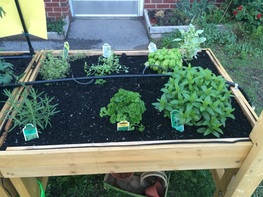|
Today I came across a video ot Chef Jamie Oliver’s visit to a grade one classroom in the States (which you can see here). Students were surprisingly unable to identify basic vegetables and fruit, with one child guessing that tomatoes were potatoes. People’s comments show a range of reactions - that this isn’t a school’s job to address; parents should teach their kids about veggies and fruits; and that McDonald’s for some low-income families is a more viable option than grocery stores. While there were some interesting and valid points made (the McDonald’s one in particular reminds us of broader economic and political factors), I disagree with the reaction that this isn’t relevant in schools. Learning about the world around us, understanding the food we eat and where it comes from, surely is an important outcome of learning for kids with respect to nutrition and their physical health, not to mention their connection to nature and principles of growth. The good news is not all kids in school are as clueless as the kids shown in Oliver’s visit. Here in Ontario, one school in Mississauga, ON (Credit Valley P.S.) was recently featured on a CTV news piece for employing a "Reggio" approach to learning in their kindergarten class, which includes the importance of the environment as teacher. There is also an emphasis in Reggio schools of having a layout that allows for interaction in large and small groups, with the teacher, with the environment, and for the student alone as well. The approach originated post-World War II in Italy, created by a teacher and parents in the villages of the Reggio Emilia area, who believed a new way of learning was needed for kids.
The philosophy behind the Reggio approach includes the following principles (summarized from www.reggiokids.com):
If nothing else, these example schools (both the surprisingly weak one with Jamie Oliver, and the Reggio-inspired class in Mississauga) show us that incorporating environmental education is important for kids and can be done through a well designed class layout, planning of curriculum, and through interactive play with plants and gardens!
0 Comments
Leave a Reply. |
Categories
All
AuthorA passionate educator.. on a quest for a schooling model to love! Archives
August 2017
|



 RSS Feed
RSS Feed
